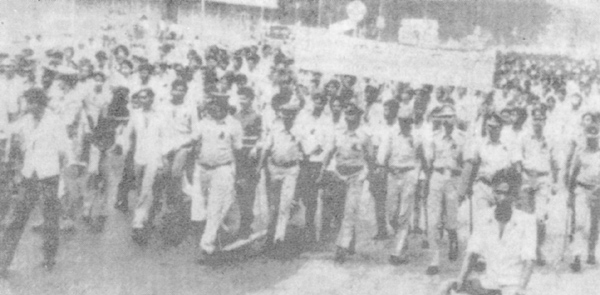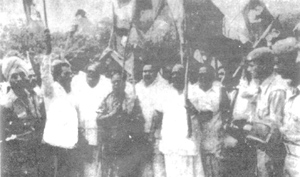
Madras students marching in protest against genocide of
Tamils in Sri Lanka.- note the black ribbons on the lapels of police
officers who also joined in the march.
The southern state of India witnessed the most sustained and continuous
campaign of protests, processions and fasts since July 25 when the news of the
latest attempt at genocide of Tamils in Sri Lanka broke out there. Even capital
cities like Bombay, Calcutta and New Delhi witnessed several protest
demonstrations.
Over 15 Tamilians in Tamil Nadu committed self immolation - drenching in
petrol and setting themselves alight - in a spirit of offering the maximum
sacrifice on behalf of the atrocities committed against the Tamil of Sri Lanka.
On August 2, Tamil Nadu and parts of other southern states came to a virtual
halt when the State government, with the full support of the central government
observed a BANDH (Hartal). The Bandh was the result of a unanimous call by all
political parties both from the government and opposition.
With the Central government, in an unprecedented step, also joined the bandh
authorising the closure of the central government offices and institutions, the
normal life of the country came to a grinding halt. Public and private transport
and communication systems came to a standstill from 0600 hours for 14 hours, the
duration of the hartal. The State government declared August 2 a public and bank
holiday
 Three
separate demonstrations were staged outside the Sri Lanka High Commission in New
Delhi on 28 July 1983 by the Congress (1) the AIADMK and the DM K to protest
against astrocities on Tamilians by the Sinhalese.
Three
separate demonstrations were staged outside the Sri Lanka High Commission in New
Delhi on 28 July 1983 by the Congress (1) the AIADMK and the DM K to protest
against astrocities on Tamilians by the Sinhalese.
About 10 AIADMK Members of Parliament led by Mrs. Satyavani Muthu, were the
first to reach the High Commission shouting "Don't kill Tamilians" and "long
live MGR". A four member deputation later met the Deputy High Commissioner and
presented to him a memorandum signed by all the 13 AIADMK MPs demanding a halt
to the rampage against Tamilians and adequate compensation to the victims. The
High Commissioner Mr. Bernard Tilakaratna was away. The Deputy High Commissioner
told the deputation that the Sri Lanka Government was doing its best to restore
normality and he would convey their feelings to Colombo.
Just as the AIADMK demonstrators dispersed about 500 Congress (1) workers led
by the party MPs and local councillors chanting "Jayawardene hai-hai, Indira
Gandhi Zindabad" and carrying placards saying "Accord citizenship to Tamilians
in Sri Lanka" marched to High Commission. About 50 MPs including Mr. G.K.
Moopanar, Mr. Jagdish Tytler, Mr. Chandulal Chandrakar and some Delhi
Metropolitan Councillors later went inside the High Commission and protested
against the atrocities being perpetrated on Tamilians in Sri Lanka.
The Tamil Nadu Cabinet, which met on 28 July 1983, expressed shock and
distress over the insecurity of life and property of Tamils in Sri Lanka. It
urged the Prime Minister, Mrs. Gandhi to find a solution to the problem through
the United Nations. In a resolution, the meeting said it was the U.N.'s
responsibility to ensure absolute protection to the minorities of any country,
and as an important member of the world body. India should take proper action to
find a just solution to the problem.
The Cabinet expressed anguish over the plight of the innocent Tamils in Sri
Lanka who had been deprived of their basic rights and were made targets of
frenzied attacks and killings on the streets. It noted that the report about the
murder of Tamil youths including Kutimani, Jagan, Thangathurai and Guhan, inside
the prison, was horrifying. It expressed sympathy for those who had lost not
property but their kith and kin. As a mark of respect to those killed in the
various incidents, the Ministers stood in silence for two minutes.